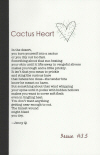Cactus Heart – May 2013
I’ve never eaten a cactus before, but I hear that it’s very good once you make it past the prickly exterior. Editor Sara Rauch of Cactus Heart magazine explains on their website how literature and art should be like the succulent interior of the desert plant: “It should shock and wound and delight us; it should fill us with delight and terror and mystery. It should survive.” This issue is their first print issue, and it is certainly a delight to read.
I’ve never eaten a cactus before, but I hear that it’s very good once you make it past the prickly exterior. Editor Sara Rauch of Cactus Heart magazine explains on their website how literature and art should be like the succulent interior of the desert plant: “It should shock and wound and delight us; it should fill us with delight and terror and mystery. It should survive.” This issue is their first print issue, and it is certainly a delight to read.
It is no surprise that Jenny Qi’s poem “Cactus Heart” appears on the front cover of this issue. Qi’s poem shows how vulnerable the human heart can be when abused or exploited: “In the desert, / you turn yourself into a cactus / or you dry out too fast.” It is difficult to trust anyone from getting too close to your heart again because the sun “makes you tough and a little prickly,” and “You don’t want anything / getting near enough to cut.” Qi makes great use of descriptions in this poem. Every line radiates with heat, and you can feel the “wind whipping your spine” as you read. This poem and this journal were definitely made for each other.
Another piece of writing that deals with the heart is Pippa Anais Gaubert’s “Heart Closet.” The author reflects on two conflicting memories of the day she came home from school to find her mother dead: “Both versions lead up to me coming home from school that day and finding my mother shot in the heart in the closet in her room. Both exist side by side in my mind like two stone pillars of a great and immovable building. And like stone they are cold and hard.” Both versions of the author’s memories involve her mother and father being unhappy in their marriage. They want a divorce, but the social pressure of living in Texas during the 1950s prevents them from doing so. The author imagines her mother shooting herself in the first version of her memory: “Mama is sitting at the kitchen counter, drinking, while I am at school. And her thoughts are getting darker. She’s figuring there is no way out of her hell.” The second version is much darker. The author imagines her father coming home, drunk, and fights with her mother, also drunk. The result is grim: “She wants to get away from him and she tries to lock herself in her bedroom but he follows her in there and he is angrier than he’s ever been and for a moment her eyes are wide because she knows he’s a violent man, she’s seen it in his eyes before.” The mood of this story matches Cactus Heart’s goal of presenting literature that fills you with “delight and terror and mystery.” It is not known which version is true, but either way, Gaubert’s words will stay planted in your mind like cold, stone pillars.
“Innocence” by Stephen V. Ramey is another dark piece of writing that will give you chills. The narrator of this short story admits to having an affair with something not of this world: “Where were you when I stood on the forest’s edge looking for signs, wishing to know love and lust and longing? It was the man in the goat skin who came—not you—the man with the horns.” Sexuality plays a big part in this story, and I like how Ramey strings his words together to create a dark and sensual mood: “I fell to the ground, and like a snake, I writhed. The goat-man writhed with me. Heat pulsed between us, venom. Delight. And then it was done, we were done.” Who is our narrator speaking to? Could it be another lover? God, perhaps? It is not clear who or what this other person may be, but this mystery makes the story more interesting.
Let’s leave the dark chambers of the heart for a moment and visit the beach in Peycho Kanev’s poem “Big Fish.” It is a short poem about our speaker meeting a giant fish sunbathing on the beach while reading a book of poetry: “I met you by the shore. Your enormous body / was left for the sharks and Japanese tourists.” Kanev writes so that one can hear the seagulls and the waves against the shore: “The seagulls flew / above us as usual, captivating our thoughts. The / eternity crept up between us . . .”
Matthew Woodman’s “Dear Moon” is a poem that reads like a Dear Abby column. Our speaker writes to the moon asking for help about a mysterious pregnancy: “Apparently, I’m pregnant. Though I’m not sure how.” The Moon replies with an interesting letter:
Dear Apparent,
These things happen.
Parthenogenesis is common
among frogs and sharks, though “common”
requires context
and may have a flexible population
This is a small issue with a simple design, but there are plenty of strong writers here. So go ahead and take a bite of Cactus Heart. You may find yourself wanting more.
[www.cactusheartpress.com]





